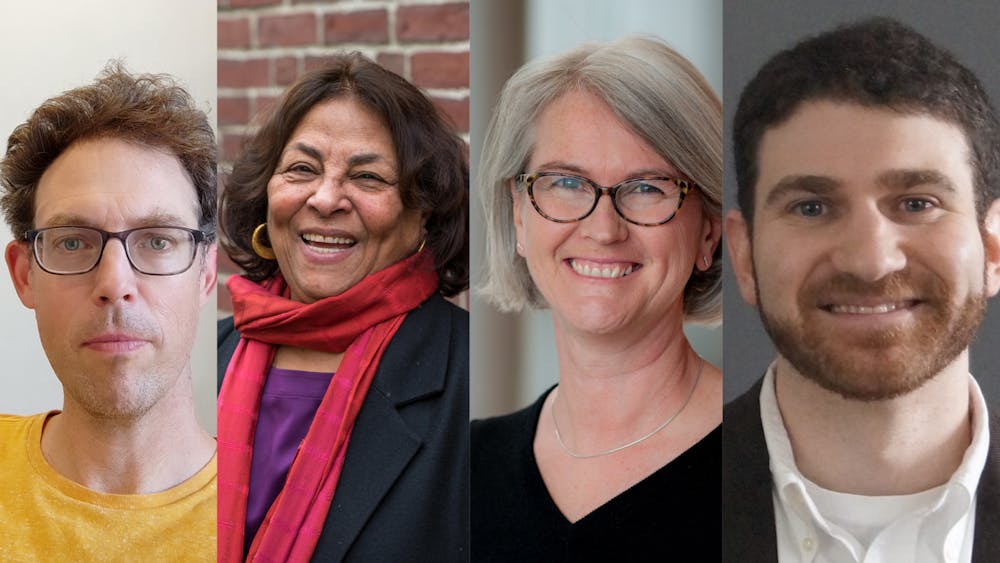Nine University faculty members received the 2023 Research Achievement Awards for their research and efforts to advance “knowledge to make a difference in the world,” according to the University’s website. Recipients of both Early Career Research Achievement Awards and Distinguished Research Achievement Awards were chosen from the categories of humanities and social sciences, life sciences and public health, physical sciences and hospital-based research.
Award recipients will receive a stipend of $5,000 to support their research. The stipend helps to elevate “the University’s recognition of the extraordinary research contributions of faculty,” Margaret Manning, assistant director for limited submissions and internal funding at the Office of Research Development, wrote in an email to The Herald on behalf of the department.
Established in 2017, the Research Achievement Awards “recognize the exceptional achievements and the global impact of research by Brown faculty,” Manning wrote.
To be eligible for the Research Achievement Awards, applicants must be nominated by their peers. These nominations “are reviewed by panels of distinguished Brown faculty” that are “convened by the vice president for research and configured each year to avoid direct conflicts of interest,” according to Manning.
For the Early Career Research Achievement Awards, faculty members must be at the assistant professor level and have scholarly achievements in “publications” or “funded research.”
For the Distinguished Research Achievement Awards, nominees must be at the rank of full professor and meet the same criteria as the early career faculty, but also have “evidence of national and/or international recognition for research within the last few calendar years,” Manning wrote.
“I was delighted to see my work recognized,” wrote Assistant Professor of History and Environment and Society Brian Lander, who received an early career research award, in an email to The Herald.
Lander’s research focuses on how people in China have transformed the country’s natural environment “into ecologically simplified agricultural landscapes” over thousands of years. Lander hopes to “reconstruct the history of these topics that were previously neglected.”
Lander is currently writing an environmental history on the Yangzi River and aims to build on his research by exploring the “history of aquaculture in China.” With his stipend, he hopes to travel to China this summer to complete field work.
Lina Fruzzetti, professor of anthropology, recalled that she was “a little bit surprised” to learn she had received the distinguished research award.
“One doesn’t do all this work to be recognized. I was thankful, of course. (But) one just does the work to see how it impacts the world that you live in,” Fruzzetti said.
Fruzzetti conducts research on India, North East Africa and Italy. Much of Fruzzetti’s work has been in the form of documentaries.
In her documentary “In My Mother’s House,” Fruzzetti details her life story as the daughter of an Italian father and Eritrean mother, hoping to shed light on a family living under colonial rule. Fruzzetti hopes to use her stipend to go back to India and Eritrea to finish another documentary.
Jonathan Pober, assistant professor of physics, was recognized with an early career research award for his work on “the evolution of the universe focusing on radio waves.”
“I was very excited to win the award,” he wrote in an email to The Herald. “There are so many researchers at Brown doing so many exciting things (that) it’s really an honor to even be in the conversation for an award like this.”
As a cosmologist and radio astronomer, Pober’s research includes the “analysis of data from the Murchison Widefield Array, designing radio telescopes for the far side of the moon and developing machine learning techniques” in his field.
In the future Pober hopes to use radio telescopes that can detect signals from when stars were first forming. With his stipend, Pober wrote he wants to better support graduate students. “Developing the next generation of researchers is one of the most important aspects of my job.”
Diane Lipscombe, director of the Carney Institute for Brain Science and professor of science and neuroscience, was “overwhelmingly thrilled and humbled” when she received the award.
Lipscombe was “thrilled to be receiving this Distinguished Research Achievement Award with such incredible faculty … students, postdocs (and) technicians,” she wrote in an email to The Herald. “This is their award as much as it is mine.”
Lipscombe primarily explores electrical signals in relation to the health of the nervous system, focusing on “neurodegeneration, chronic pain and psychiatric diseases.” Her work with these diseases has led to an interest in understanding “how neurons can transition from adaptive to maladaptive responsive states.”
Lipscombe is already involved with multiple projects on neuron-immune pathways and new technologies to regulate neurons. Lipscombe hopes to continue with research that will further neuroscientists’ understanding of neuron responsiveness to chronic pain and neurodegenerative diseases.
With her stipend, she hopes to support “the students and postdocs in the lab to help them attend scientific meetings to present their exciting research.”
The remaining five awards were received by Professor of Cognitive, Linguistic and Psychological Sciences Oriel FeldmanHall, Professor of Medicine Alan Morrison, Professor of Psychiatry and Human Behavior Mary Carskadon, Professor of Social Science, Anthropology and Italian Studies David Kertzer ’69 and Professor of Applied Mathematics Chi-Wang Shu.
The nine recipients of the 2023 Research Achievement Awards will be honored April 24.





